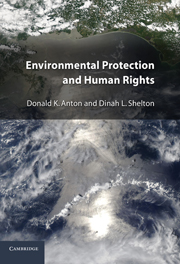Book contents
- Frontmatter
- Contents
- Acknowledgments
- Abbreviations
- Table of Cases
- 1 Law and the Environment
- 2 The Environment as a Human Rights Issue
- 3 An Introduction to Human Rights Origins and Theory
- 4 The International Protection of Human Rights
- 5 International Human Rights Institutions and Procedures
- 6 Procedural Human Rights and the Environment
- 7 Substantive Human Rights and the Environment
- 8 Indigenous Peoples, Rights, and the Environment
- 9 Humanitarian Crises: Armed Conflicts and Other Disasters
- 10 Environmental Rights and International Finance: The World Bank Example
- 11 Human Rights, the Environment, and Corporate Accountability
- Index
10 - Environmental Rights and International Finance: The World Bank Example
Published online by Cambridge University Press: 05 June 2012
- Frontmatter
- Contents
- Acknowledgments
- Abbreviations
- Table of Cases
- 1 Law and the Environment
- 2 The Environment as a Human Rights Issue
- 3 An Introduction to Human Rights Origins and Theory
- 4 The International Protection of Human Rights
- 5 International Human Rights Institutions and Procedures
- 6 Procedural Human Rights and the Environment
- 7 Substantive Human Rights and the Environment
- 8 Indigenous Peoples, Rights, and the Environment
- 9 Humanitarian Crises: Armed Conflicts and Other Disasters
- 10 Environmental Rights and International Finance: The World Bank Example
- 11 Human Rights, the Environment, and Corporate Accountability
- Index
Summary
Intergovernmental Financial Institutions and Their Origins
This chapter examines the performance of intergovernmental financial institutions in relation to how well the projects they finance respect human rights and limit harmful environmental impacts. These financial institutions are commonly known as multilateral development banks (MDBs). There are five such banks in existence today. One, the World Bank, is global in scope. The four others are regional: the African Development Bank, the Asian Development Bank, the European Bank for Reconstruction and Development, and the Inter-American Development Bank. In addition, there are six subregional banks (for East Africa, West Africa, the Caribbean, Central America, and the Black Sea), whose membership is typically limited to borrowing nations. This tells us the number of MDBs, but what exactly are multilateral development banks? The following excerpt provides some guidance.
The World Bank Group traces its origins to the historic U.N. Monetary and Financial Conference of July 1944, where representatives of forty-five governments met to produce the modern system of international trade and economic cooperation that was the basis for the global postwar expansion. This conference is commonly known as the Bretton Woods conference, after the New Hampshire town where the conference was held.
The understanding that economic rivalries between the major industrial powers in the 1930s had led to the eruption of war predominated at the Bretton Woods conference. With victory imminent for the Allied powers, the conference attendees sought to establish an international framework in which restrictions on international trade favoring individual states were removed.
- Type
- Chapter
- Information
- Environmental Protection and Human Rights , pp. 779 - 862Publisher: Cambridge University PressPrint publication year: 2011



